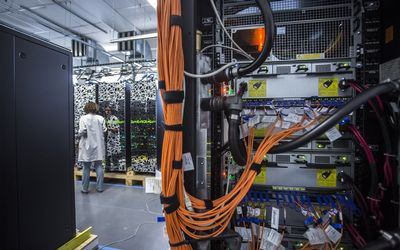NEARLY three decades ago, Warren Buffett penned a letter to his adoring investors mocking an insidious new trend in the money management industry: the computer. "Investment success will not be produced by arcane formulas, computer programs or signals flashed by the price behaviour of stocks and markets," he scoffed in his 1987 annual letter.
But the chairman of Berkshire Hathaway may have short-changed one of the great forces reshaping investment. Gargantuan strides in computing power have revolutionised virtually every facet of modern life, and financial markets are no exception.
The most successful hedge funds are scooping up computer scientists, not economists and investment bankers with MBAs. Even staid mutual funds now eagerly harness the "quantitative" techniques enabled by modern computing and complex mathematical models.
The next frontier of this technological arms race in finance is artificial intelligence (AI).
Advances in AI research have triggered immense interest in the industry, where some believe a thinking, learning and trading computer will make even today’s superfast, ultracomplex investment algorithms look archaic — and possibly render human fund managers redundant.
Could the next generation’s Buffett be a superalgorithm? Some of the world’s biggest money managers are betting on it.
Bridgewater, the world’s biggest hedge fund group, poached the head of IBM’s artificial intelligence unit in 2012, and last year BlackRock and Two Sigma, another rapidly growing hedge fund that uses quantitative models, hired two former top Google engineers.
Headhunters say computer scientists are now the hottest property in finance.
...
THE quantitative investment world plays down the prospect of machines supplanting human fund managers, pointing out that the prospect of full artificial intelligence is still distant, and arguing that human ingenuity still plays a vital role. But the confident swagger of the money-management nerds is unmistakable.
Already quasi-AI trading strategies are working their magic in financial markets, and the future belongs to them, they predict.
"The challenge facing the investment world is that the human mind has not become any better than it was 100 years ago, and it’s very hard for someone using traditional methods to juggle all the information of the global economy in their head," David Siegel, co-head of Two Sigma, one of the leading computer-powered hedge funds, said last year.
"Eventually, the time will come that no human investment manager will be able to beat the computer."
Yin Luo first learned to code when he was 11, after his father brought a used Apple II computer back to China in 1985. He taught himself to program and made a primitive version of Tanks, where the player shoots down randomly generated airplanes.
Today, he is part of a growing tribe of brainiacs on Wall Street exploring the bleeding edge of computer science.
Luo is the chief "quant" (quantitative analyst) at Deutsche Bank, where his team has developed an AI algorithm that autonomously scours the financial system for investment opportunities, scraping unfathomably large data sets to unearth profitable patterns to proffer clients.
Quants have long harnessed increasingly powerful computers to crunch numbers and find statistical signals of lucrative opportunities, but machine-learning goes a step further. A machine-learning algorithm is a dynamic creature that scans through large data sets — such as stock prices, weather patterns, earnings call transcripts — sniffing out predictive signals.
Matthew Dixon, assistant professor of finance at the Illinois Institute of Technology, calls machine-learning an "optimisation machine that minimises chaos". It can learn the difference between bananas and apples and sort them out, or even teach a computer how to play and quickly master a game like Super Mario from scratch.
Machine-learning can also be unleashed on "unstructured data", such as jumbled numbers, but also images and videos that are usually difficult for a computer to understand. More powerful computers mean that it can now be applied to financial markets.
"It’s a very promising area," Luo says. "Artificial intelligence can help you find patterns a human would never see. That can give you a huge edge."
...
BUT that is not the only advantage of machine-learning. When markets undergo what industry participants call a "regime change" and trusted strategies no longer apply, one of the classic challenges for quants is that their models can often prove useless — or worse. Algorithmic trading strategies that print money one day can blow up the next.
A machine-learning algorithm will autonomously evolve and search for new patterns, adjusting to what works in markets that day, week or year.
That means asset managers can use them as a tool to enhance their investment process, perhaps by screening for patterns undetectable by humans, or even to develop strategies and trade by itself.
For Nick Granger, a fund manager at Man AHL, a quant hedge fund, this is the crucial edge. "You see it creating intuitive trading strategies from the bottom up, switching styles according to what works," he says.
"We have been successfully using machine-learning for the past few years and are interested in investing in it more."
Nonetheless, machine-learning has pitfalls. One of the biggest challenges for quants is a phenomenon called "overfitting", when an overly complex or badly coded algorithm finds specious correlations or false signals in the noise of data.
For example, a blog called "Spurious Correlations" notes that margarine consumption is closely linked to divorce rates in Maine, and Nick Cage films to swimming pool drownings.
Even if a model works well in testing, it can collapse when confronted by real markets. New data can itself be affected by the trading algorithm, says Osman Ali, a quant at Goldman Sachs’s asset-management arm.
"If you crunch weather data, you’re not affecting the weather, but if you trade markets, you are affecting them," he says.
Nor can even the most advanced AI trading algorithms think as creatively as a human, especially in a crisis. Brad Betts, a former Nasa computer scientist now working at BlackRock’s "scientific active equity" arm, highlights the 2009 emergency plane landing on the Hudson River as an example of when man trumps machine.
Indeed, some quants remain sceptical that machine-learning — or AI more broadly — is a holy grail for investment. Many see it merely as a new, advanced gizmo to supplement their existing toolkit, while others argue it is largely clever marketing rather than something genuinely revolutionary.
SO, will human fund-managers go the way of the dodo? Perhaps not quite, but the future looks more challenging.
Two Sigma’s David Siegel says managing money has become harder, as markets and economies have become more complex. "Fifty years ago, a human fund-manager could possibly know all that was needed to know to invest well. That isn’t likely any more," he argues.
Rather than a danger, he sees this as a clear boon.
"One day (the global economy) could become too complicated to control and there is no guarantee it will run smoothly. But algorithms could help us understand it better. People talk about how robots will destroy the world, but I think robots will save it."
Investing is about information management, rational analysis and speed. That plays to a machine’s strengths. But human asset managers will adapt rather than disappear. Most probably, the future of investment management will involve a synthesis of human and artificial intelligence that harnesses the power of both. ©
The Financial Times Limited 2016

Advances in artificial intelligence research could lead to a thinking, learning and trading computer, making human fund managers redundant. Picture: BLOOMBERG/BALINT PORNECZE
NEARLY three decades ago, Warren Buffett penned a letter to his adoring investors mocking an insidious new trend in the money management industry: the computer. "Investment success will not be produced by arcane formulas, computer programs or signals flashed by the price behaviour of stocks and markets," he scoffed in his 1987 annual letter.
But the chairman of Berkshire Hathaway may have short-changed one of the great forces reshaping investment. Gargantuan strides in computing power have revolutionised virtually every facet of modern life, and financial markets are no exception.
The most successful hedge funds are scooping up computer scientists, not economists and investment bankers with MBAs. Even staid mutual funds now eagerly harness the "quantitative" techniques enabled by modern computing and complex mathematical models.
The next frontier of this technological arms race in finance is artificial intelligence (AI).
Advances in AI research have triggered immense interest in the industry, where some believe a thinking, learning and trading computer will make even today’s superfast, ultracomplex investment algorithms look archaic — and possibly render human fund managers redundant.
Could the next generation’s Buffett be a superalgorithm? Some of the world’s biggest money managers are betting on it.
Bridgewater, the world’s biggest hedge fund group, poached the head of IBM’s artificial intelligence unit in 2012, and last year BlackRock and Two Sigma, another rapidly growing hedge fund that uses quantitative models, hired two former top Google engineers.
Headhunters say computer scientists are now the hottest property in finance.
...
THE quantitative investment world plays down the prospect of machines supplanting human fund managers, pointing out that the prospect of full artificial intelligence is still distant, and arguing that human ingenuity still plays a vital role. But the confident swagger of the money-management nerds is unmistakable.
Already quasi-AI trading strategies are working their magic in financial markets, and the future belongs to them, they predict.
"The challenge facing the investment world is that the human mind has not become any better than it was 100 years ago, and it’s very hard for someone using traditional methods to juggle all the information of the global economy in their head," David Siegel, co-head of Two Sigma, one of the leading computer-powered hedge funds, said last year.
"Eventually, the time will come that no human investment manager will be able to beat the computer."
Yin Luo first learned to code when he was 11, after his father brought a used Apple II computer back to China in 1985. He taught himself to program and made a primitive version of Tanks, where the player shoots down randomly generated airplanes.
Today, he is part of a growing tribe of brainiacs on Wall Street exploring the bleeding edge of computer science.
Luo is the chief "quant" (quantitative analyst) at Deutsche Bank, where his team has developed an AI algorithm that autonomously scours the financial system for investment opportunities, scraping unfathomably large data sets to unearth profitable patterns to proffer clients.
Quants have long harnessed increasingly powerful computers to crunch numbers and find statistical signals of lucrative opportunities, but machine-learning goes a step further. A machine-learning algorithm is a dynamic creature that scans through large data sets — such as stock prices, weather patterns, earnings call transcripts — sniffing out predictive signals.
Matthew Dixon, assistant professor of finance at the Illinois Institute of Technology, calls machine-learning an "optimisation machine that minimises chaos". It can learn the difference between bananas and apples and sort them out, or even teach a computer how to play and quickly master a game like Super Mario from scratch.
Machine-learning can also be unleashed on "unstructured data", such as jumbled numbers, but also images and videos that are usually difficult for a computer to understand. More powerful computers mean that it can now be applied to financial markets.
"It’s a very promising area," Luo says. "Artificial intelligence can help you find patterns a human would never see. That can give you a huge edge."
...
BUT that is not the only advantage of machine-learning. When markets undergo what industry participants call a "regime change" and trusted strategies no longer apply, one of the classic challenges for quants is that their models can often prove useless — or worse. Algorithmic trading strategies that print money one day can blow up the next.
A machine-learning algorithm will autonomously evolve and search for new patterns, adjusting to what works in markets that day, week or year.
That means asset managers can use them as a tool to enhance their investment process, perhaps by screening for patterns undetectable by humans, or even to develop strategies and trade by itself.
For Nick Granger, a fund manager at Man AHL, a quant hedge fund, this is the crucial edge. "You see it creating intuitive trading strategies from the bottom up, switching styles according to what works," he says.
"We have been successfully using machine-learning for the past few years and are interested in investing in it more."
Nonetheless, machine-learning has pitfalls. One of the biggest challenges for quants is a phenomenon called "overfitting", when an overly complex or badly coded algorithm finds specious correlations or false signals in the noise of data.
For example, a blog called "Spurious Correlations" notes that margarine consumption is closely linked to divorce rates in Maine, and Nick Cage films to swimming pool drownings.
Even if a model works well in testing, it can collapse when confronted by real markets. New data can itself be affected by the trading algorithm, says Osman Ali, a quant at Goldman Sachs’s asset-management arm.
"If you crunch weather data, you’re not affecting the weather, but if you trade markets, you are affecting them," he says.
Nor can even the most advanced AI trading algorithms think as creatively as a human, especially in a crisis. Brad Betts, a former Nasa computer scientist now working at BlackRock’s "scientific active equity" arm, highlights the 2009 emergency plane landing on the Hudson River as an example of when man trumps machine.
Indeed, some quants remain sceptical that machine-learning — or AI more broadly — is a holy grail for investment. Many see it merely as a new, advanced gizmo to supplement their existing toolkit, while others argue it is largely clever marketing rather than something genuinely revolutionary.
SO, will human fund-managers go the way of the dodo? Perhaps not quite, but the future looks more challenging.
Two Sigma’s David Siegel says managing money has become harder, as markets and economies have become more complex. "Fifty years ago, a human fund-manager could possibly know all that was needed to know to invest well. That isn’t likely any more," he argues.
Rather than a danger, he sees this as a clear boon.
"One day (the global economy) could become too complicated to control and there is no guarantee it will run smoothly. But algorithms could help us understand it better. People talk about how robots will destroy the world, but I think robots will save it."
Investing is about information management, rational analysis and speed. That plays to a machine’s strengths. But human asset managers will adapt rather than disappear. Most probably, the future of investment management will involve a synthesis of human and artificial intelligence that harnesses the power of both. ©
The Financial Times Limited 2016




















Change: 1.19%
Change: 1.36%
Change: 2.19%
Change: 1.49%
Change: -0.77%
Data supplied by Profile Data
Change: -0.08%
Change: 0.12%
Change: 1.19%
Change: 0.00%
Change: 0.10%
Data supplied by Profile Data
Change: 0.32%
Change: 0.40%
Change: 0.40%
Change: 0.22%
Change: 0.58%
Data supplied by Profile Data
Change: 0.08%
Change: -0.41%
Change: -0.13%
Change: -0.33%
Change: 0.10%
Data supplied by Profile Data